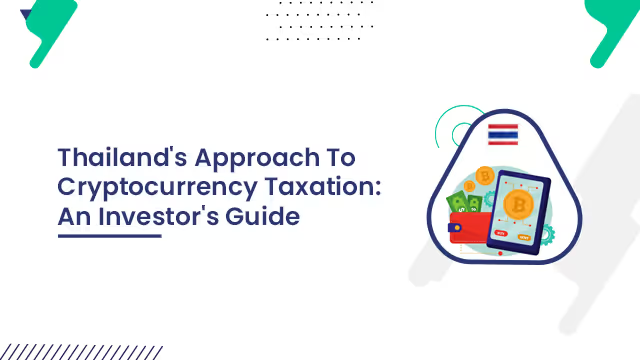.avif)
Calculate Your Crypto
Taxes in Minutes

Thailand is emerging as a major player in cryptocurrencies. But with all this rush, Understanding taxes can be tricky. Whether you're a seasoned investor or just starting out, this guide will break down Thailand's crypto tax rules in a clear and simple way.
By understanding Thailand crypto tax regulations, you can make informed investment decisions and ensure your digital finance are smooth sailing. Let's dive in and get you started!
Thailand’s Crypto Taxation Rules Explained
Capital Gains Tax
This 15% tax applies to any profits you make from buying and selling crypto.
Thailand lets you choose how to track your gains, with two options:
First-In-First-Out (FIFO):
First In, First Out (FIFO) stands out as one of the simplest ways to calculate your cost basis. In simple terms, it means that the assets you bought first are the ones you sell first.
From a tax standpoint, FIFO can work in your favor by potentially qualifying you for long-term Capital Gains Tax discounts, which tend to be lower compared to short-term rates.
However, it's worth noting that FIFO might result in higher gains being taxed, especially if you've held onto assets for a long time and they've significantly appreciated in value.
Average Cost Basis (ACB):
Stands out as another easy way to determine your cost basis, especially when dealing with financial assets like shares.
To calculate your cost basis using ACB, you simply find the average cost for all your assets. This involves adding up the total amount you paid to purchase your assets and dividing it by the total number of coins or tokens you own.
For instance, if you own 5 BTC purchased at different prices, you'd add up those prices and divide by 5. This process applies to all the various cryptocurrencies in your portfolio.
Countries like Canada, the UK, and France use the average cost basis method, though they may have additional rules. For example, the UK uses the Share Pooling method, incorporating wash sale rules, while France uses the Weighted Average Acquisition Price (PMPA), and Japan employs either the Moving Average or Total Average Method. Despite these variations, they all operate similarly to the average cost basis method but with minor distinctions.
Remember: You can only pick one method per year for all your crypto transactions. You can switch methods next year, though.
Income Tax :
Thailand also has taxes on other crypto income which comes under INCOME TAX
- Trading: This includes any profits you make from buying, selling, or swapping crypto.
- Mining: The crypto you mine isn't taxed until you sell it.
- Working with Crypto: Getting paid in crypto for a job or freelance gig counts as income.
- Crypto Gifts & Rewards: Awards, gifts, or prizes received in the form of digital assets are also taxable.
- Investment Returns: Profits from crypto investments get taxed as well.
- Staking & Lending Interest: A specific tax is imposed on any interest you earn on crypto lending or staking activities.
Complying with Thai Crypto Tax Laws
Ever traded cryptocurrencies like Bitcoin or Ethereum in Thailand? If so, you might be wondering how to stay on top of Thai tax laws. Here's a breakdown to make things crystal clear.
Rule 1: Be Upfront About Your Crypto
The Thai government wants to know about your crypto holdings. This means reporting all your crypto transactions, from buying and selling coins to swapping them on exchanges.
Rule 2: Keep Track of Everything
You'll need to keep good records of your crypto transactions. This includes dates, amounts, and what exactly you did (bought, sold, or swapped?). Having clear records helps you to figure out your profits and losses and accurately report your taxes on time.
Rule 3: Know What You Owe (and What You Can Save)
Taxes can seem complicated, but they don't have to be. There are specific taxes that might apply to your crypto gains, just like with stocks or real estate. The good news? There might also be deductions or credits you can claim to lower your tax bill. Understanding these can save you some serious baht!
Efficient Tax Planning with Cryptocurrencies
Don't wait until the last minute to gather your paperwork and transaction records for tax filing. Be proactive and prepare ahead of time. Consider these helpful strategies to minimize mistakes, ensure precise tax calculations, and potentially lower your tax bill. Stay informed about the latest updates and changes in cryptocurrency taxation laws in Thailand.
Maximize Tax Benefits with Tax Loss Harvesting
One smart tactic to consider is tax loss harvesting. Essentially, this means using your losses from investments to balance out any gains you've made during the year, ultimately reducing your overall tax bill.
In Thailand, if you've experienced losses from trading cryptocurrencies or digital tokens, you can use those losses to offset the income you've earned within the same period.
Use a Crypto Tax Software
Using dedicated tools and resources tailored for managing crypto investments can make staying compliant much easier. These resources can help you keep thorough records, calculate profits and losses accurately, and stay informed about the latest tax regulations.
For those looking to streamline their crypto tax reporting, platforms like Kryptos could be worth considering.
Keep your documents prepared and handy
To file your crypto taxes smoothly, you'll need some documents. Here's a checklist to keep you on track:
- Amounts of tokens bought and sold
- Price of each cryptocurrency on each transaction date
- Exchange rate references
- Details of any buyers/sellers involved
- Tax invoices or expense receipts
- Withholding tax certificate (if applicable)
It's vital to keep ourselves updated and practice prudent investment habits. The Thai government's aim to blend innovation with financial stability mirrors a worldwide shift towards embracing cryptocurrency in traditional finance systems. Moving forward, these regulatory changes will definitely influence how cryptocurrencies are used and traded in Thailand, offering both hurdles and chances for investors.
| Step | Form | Purpose | Action |
|---|---|---|---|
| 1 | 1099-DA | Reports digital asset sales or exchanges | Use to fill out Form 8949. |
| 2 | Form 1099-MISC | Reports miscellaneous crypto income | Use to fill out Schedule 1 or C. |
| 3 | Form 8949 | Details individual transactions | List each transaction here. |
| 4 | Schedule D | Summarizes capital gains/losses | Transfer totals from Form 8949. |
| 5 | Schedule 1 | Reports miscellaneous income | Include miscellaneous income (if not self-employment). |
| 6 | Schedule C | Reports self-employment income | Include self-employment income and expenses. |
| 7 | Form W-2 | Reports wages (if paid in Bitcoin) | Include wages in total income. |
| 8 | Form 1040 | Primary tax return | Summarize all income, deductions, and tax owed. |
| Date | Event/Requirement |
|---|---|
| January 1, 2025 | Brokers begin tracking and reporting digital asset transactions. |
| February 2026 | Brokers issue Form 1099-DA for the 2025 tax year to taxpayers. |
| April 15, 2026 | Deadline for taxpayers to file their 2025 tax returns with IRS data. |
| Timeline Event | Description |
|---|---|
| Before January 1, 2025 | Taxpayers must identify wallets and accounts containing digital assets and document unused basis. |
| January 1, 2025 | Snapshot date for confirming remaining digital assets in wallets and accounts. |
| March 2025 | Brokers begin issuing Form 1099-DA, reflecting a wallet-specific basis. |
| Before Filing 2025 Tax Returns | Taxpayers must finalize their Safe Harbor Allocation to ensure compliance and avoid penalties. |
| Feature | Use Case Scenario | Technical Details |
|---|---|---|
| Automated Monitoring of Transactions | Alice uses staking on Ethereum 2.0 and yield farming on Uniswap. Kryptos automates tracking of her staking rewards and LP tokens across platforms. | Integrates with Ethereum and Uniswap APIs for real-time tracking and monitoring of transactions. |
| Comprehensive Data Collection | Bob switches between liquidity pools and staking protocols. Kryptos aggregates all transactions, including historical data. | Pulls and consolidates data from multiple sources and supports historical data imports. |
| Advanced Tax Categorization | Carol earns from staking Polkadot and yield farming on Aave. Kryptos categorizes her rewards as ordinary income and investment income. | Uses jurisdiction-specific rules to categorize rewards and guarantee compliance with local tax regulations. |
| Dynamic FMV Calculation | Dave redeems LP tokens for Ethereum and stablecoins. Kryptos calculates the fair market value (FMV) at redemption and during sales. | Updates FMV based on market data and accurately calculates capital gains for transactions. |
| Handling Complex DeFi Transactions | Eve engages in multi-step DeFi transactions. Kryptos tracks value changes and tax implications throughout these processes. | Manages multi-step transactions, including swaps and staking, for comprehensive tax reporting. |
| Real-Time Alerts and Updates | Frank receives alerts on contemporary tax regulations affecting DeFi. Kryptos keeps him updated on relevant changes in tax laws. | Observe regulatory updates and provide real-time alerts about changes in tax regulations. |
| Seamless Tax Reporting Integration | Grace files taxes using TurboTax. Kryptos integrates with TurboTax to import staking and yield farming data easily. | Direct integration with tax software like TurboTax for smooth data import and multi-jurisdictional reporting. |
| Investor Type | Impact of Crypto Tax Updates 2025 |
|---|---|
| Retail Investors | Standardized crypto reporting regulations make tax filing easier, but increased IRS visibility raises the risk of audits. |
| Traders & HFT Users | To ensure crypto tax compliance, the IRS is increasing its scrutiny and requiring precise cost-basis calculations across several exchanges. |
| Defi & Staking Participants | The regulations for reporting crypto transactions for staking rewards, lending, and governance tokens are unclear, and there is a lack of standardization for decentralized platforms. |
| NFT Creators & Buyers | Confusion over crypto capital gains tax in 2025, including the taxation of NFT flips, royalties, and transactions across several blockchains. |
| Crypto Payments & Businesses | Merchants who take Bitcoin, USDC, and other digital assets must track crypto capital gains for each transaction, which increases crypto tax compliance requirements. |
| Event | Consequences | Penalties |
|---|---|---|
| Reporting Failure | The tax authorities can mark uncontrolled revenues and further investigate. | Penalty fines, interest on unpaid taxes and potential fraud fees if they are deliberately occurring. |
| Misreporting CGT | Misreporting CGT Error reporting profits or losses can trigger the IRS audit. | 20% fine on under -ported zodiac signs, as well as tax and interest. |
| Using decentralized exchanges (DEXs) or mixers without records | The IRS can track anonymous transactions and demand documentation. | Possible tax evasion fee and significant fine. |
| Disregarding Bitcoin mining tax liabilities | Mining reward is considered taxable income, and failure of the report can be regarded as tax fraud. | Further tax obligations, punishment and potential legal steps. |
| Foreign crypto holdings: Non-disclosure | Foreign-accepted crypto FATCA may be subject to reporting rules. | Heavy fines (up to $ 10,000 per fracture) or prosecution for intentional non-transport. |
File Your Crypto Tax in Minutes











